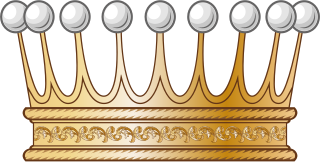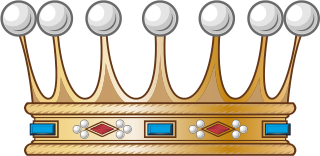A prince is a male ruler ranked below a king and above a duke or member of a monarch's or former monarch's family. Prince is also a title of nobility, often hereditary, in some European states. The feminine equivalent is a princess. The English word derives, via the French word prince, from the Latin noun princeps, from primus (first) and capio, meaning "the chief, most distinguished, ruler, prince".

An oath of fealty, from the Latin fidelitas (faithfulness), is a pledge of allegiance of one person to another.
Escheat is a common law doctrine that transfers the real property of a person who died without heirs to the Crown or state. It serves to ensure that property is not left in "limbo" without recognized ownership. It originally applied to a number of situations where a legal interest in land was destroyed by operation of law, so that the ownership of the land reverted to the immediately superior feudal lord.

Graf (male) or Gräfin (female) is a historical title of the German nobility, usually translated as "count". Considered to be intermediate among noble ranks, the title is often treated as equivalent to the British title of "earl".

Landgrave was a noble title used in the Holy Roman Empire, and later on in its former territories. The German titles of Landgraf, Markgraf ("margrave"), and Pfalzgraf are in the same class of ranks as Herzog ("duke") and above the rank of a Graf ("count").

In English and Irish history, the lordship of a manor is a lordship emanating from the feudal system of manorialism. In modern England and Wales, it is recognised as a form of property, one of three elements of a manor that may exist separately or be combined, and may be held in moieties:
- the title ;
- the manorial, comprising the manor and/or its land; and
- the seignory, rights granted to the titular holder of the manor.

In England, a county palatine or palatinate was an area ruled by a hereditary nobleman enjoying special authority and autonomy from the rest of a kingdom or empire. The name derives from the Latin adjective palātīnus, "relating to the palace", from the noun palātium, "palace". It thus implies the exercise of a quasi-royal prerogative within a county, that is to say a jurisdiction ruled by an earl, the English equivalent of a count. A duchy palatine is similar but is ruled over by a duke, a nobleman of higher precedence than an earl or count.
The Mediatized Houses were ruling princely and comital-ranked houses which were mediatized in the Holy Roman Empire during the period of 1803–15 as part of German mediatization, and were later recognised in 1825-29 by the German ruling houses as possessing considerable rights and rank. With few exceptions, these houses were those whose heads held a seat in the Imperial Diet when mediatized during the establishment of the Confederation of the Rhine in 1806–07, by France in 1810, or by the Congress of Vienna in 1814–15. The Mediatized Houses were organised into two ranks: the princely houses, entitled to the predicate Durchlaucht, which previously possessed a vote on the Bench of Princes (Furstenbank); and the comital houses which were accorded the address of Erlaucht, which previously possessed a vote in one of the four Benches of Counts (Gräfenbank}. Whilst some form of mediatization occurred in other countries, such as France, Italy and Russia, only designated houses within the former Holy Roman Empire legally comprised the Mediatized Houses.

Vidame was a feudal title in France, a term descended from mediaeval Latin vicedominus. Like the avoué or advocatus, the vidame was originally a secular official chosen by the bishop of the diocese—with the consent of the count—to perform functions on behalf of the church's earthly interest that were religiously inappropriate; this especially included violence, even in the service of justice, and to act as protector.

The four banal was a feudal institution in medieval France. The feudal lord often had, among other banal rights, the duty to provide and the privilege to own all large ovens within his fief, each operated by an ovenmaster or fournier. In exchange, personal ovens were generally outlawed and commoners were thus compelled to use the seigniorial oven to bake their bread. Such use was subject to payment, in kind or money, originally intended merely to cover the costs associated to the construction, maintenance and operation of the oven. Seigniorial ovens were masonry ovens built on the Roman plan and were large enough to hold an entire community's ration of bread.

Prince of the Holy Roman Empire was a title attributed to a hereditary ruler, nobleman or prelate recognised as such by the Holy Roman Emperor.
An allod, also allodial land or allodium, refers, in the law of the Middle Ages and early Modern Period and especially within the Holy Roman Empire, to a freehold estate in land over which the allodial landowner (allodiary) had full ownership and right of alienation.
A barony is an administrative division of a county in Scotland, Ireland and outlying parts of England. It has a lower rank and importance than a county.
Droit de régale is a medieval legal term and originally denoted rights that belonged exclusively to the king, either as essential to his sovereignty, such as royal authority; or accidental, such as the right of the chase, of fishing, mining, etc. By abuse, many sovereigns in the Middle Ages and in later times claimed the right to seize the revenues of vacant episcopal sees or imperial abbeys. Gradually, jus regaliae came to be applied almost exclusively to that assumed right.

A heerlijkheid was a landed estate that served as the lowest administrative and judicial unit in rural areas in the Dutch-speaking Low Countries before 1800. It originated as a unit of lordship under the feudal system during the Middle Ages. The English equivalents are manor, seigniory, and lordship. The heerlijkheid system was the Dutch version of manorialism that prevailed in the Low Countries and was the precursor to the modern municipality system in the Netherlands and Flemish Belgium.

Herzog is a German hereditary title held by one who rules a territorial duchy, exercises feudal authority over an estate called a duchy, or possesses a right by law or tradition to be referred to by the ducal title. The word is usually translated by the English duke and the Latin dux. Generally, a Herzog ranks below a king and above a count. Whether the title is deemed higher or lower than titles translated into English as "prince" (Fürst) has depended upon the language, country and era in which the titles co-existed.

Nobility is a social class normally ranked immediately under royalty and found in some societies that have a formal aristocracy. Nobility possesses more acknowledged privileges and higher social status than most other classes in society. The privileges associated with nobility may constitute substantial advantages over or relative to non-nobles, or may be largely honorary, and vary by country and era. As referred to in the Medieval chivalric motto "noblesse oblige", nobles can also carry a lifelong duty to uphold various social responsibilities, such as honorable behavior, customary service, or leadership positions. Membership in the nobility, including rights and responsibilities, is typically hereditary.

Imperial Count was a title in the Holy Roman Empire. In the medieval era, it was used exclusively to designate the holder of an imperial county, that is, a fief held directly (immediately) from the emperor, rather than from a prince who was a vassal of the emperor or of another sovereign, such as a duke or prince-elector. These imperial counts sat on one of the four "benches" of Counts, whereat each exercised a fractional vote in the Imperial Diet until 1806.
Seigneur, was the name formerly given in France to someone who had been granted a fief by the crown, with all its associated rights over person and property. This form of lordship was called seigneurie, the rights that the seigneur was entitled to were called seigneuriage, and the seigneur himself was the seigneur justicier, because he exercised greater or lesser jurisdiction over his fief. Since the repeal of the feudal system on 4 August 1789 in the wake of the French Revolution, this office has no longer existed and the title has only been used for sovereign princes by their families.














